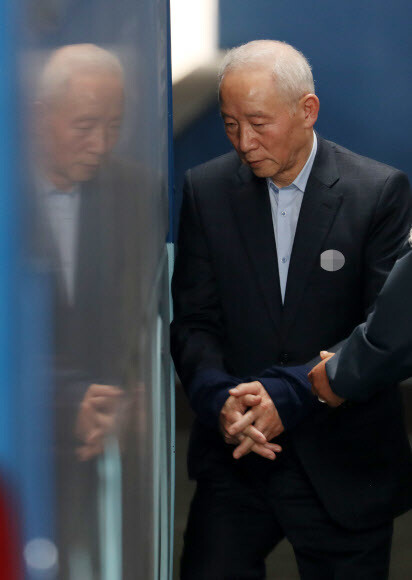hankyoreh
Links to other country sites 다른 나라 사이트 링크
Former NIS director made fake office and falsified documents to thwart prosecutors’ investigation

Former National Intelligence Service (NIS) Director Nam Jae-joon established a fake office in the agency with falsified documents in preparation for a search and seizure in 2013 by a Seoul Central District Prosecutors’ Office special investigation of the NIS’ election-influencing activities on the internet. Jang Ho-joong, a former director of the Busan Prosecutors’ Office who was then deployed to the NIS, played a leading role in deceiving his fellow prosecutors. Nam and others also ordered NIS staffers to make false statements during the investigation and trial process.
The Supreme Court’s second division under Justice Noh Jeong-hee upheld an original ruling on Mar. 14 sentencing Nam and six others to prison on charges including conspiracy to obstruct the exercise of official duties through their systematic efforts to impede the investigation. The decision came six years after the incident in question occurred.
Nam received a sentence of three years and six months; Seo Cheon-ho, former NIS second vice director, two years and six months; Kim Jin-hong, former psychological warfare division chief, two years; and Ko Il-hyeon, former general analysis bureau chief, and Moon Jeong-wook, government subversion bureau chief, 18 months each. Sentences of one year for Jang and 18 months for Lee Je-young, former senior prosecutor, were also upheld. Former NIS spokesperson Ha Gyeong-joon received a one-year sentence suspended for two years.
At the time of the incident, Nam and others formed a task force of managers and staffers to ensure that the prosecutors’ investigation did not uncover the NIS’ political meddling and election inference. This led in turn to the creation of a fake office and orders for NIS staffers to give false testimonies. Some staffers were also sent to Russia on business to prevent them from appearing as witnesses in court. Both the first trial court and the appellate court ruled against the defendants, with the latter concluding that they had “systematically obstructed the prosecutors’ investigation and trial out of fears that the investigation would lead to the NIS’ functions being diminished and create a burden for the newly inaugurated [Park Geun-hye] administration.”
Unlike the first court, the appellate court acquitted some of the defendants on charges of abuse of power to obstruct the exercise of rights – a decision that was also upheld by the Supreme Court. The conclusion was that while Jang did instruct staffers to conceal important evidentiary documents while serving as director the NIS inspection office, the security of the documents fell under the scope of the staffers’ duties and did not constitute “forcing others to engage in activities that are not their duties” as stated in the description of the crime of abuse of power. Regarding charges that Moon Jeong-wook had Samsung and others provide support funds to specific conservative groups, the Supreme Court upheld the original trial court’s acquittal on the grounds that this did not constitute abuse of authority because it was not an NIS duty.
The same argument regarding abuse of power has been cited by former Supreme Court Chief Justice Yang Sung-tae, who was recently indicted for judicial misconduct. During the prosecutors’ investigation, it was revealed that Noh Jeong-hee, the Supreme Court Justice presiding over the NIS case, received a National Court Administration opinion on “judgment methods” in 2016 during her time as a lower-court presiding judge in a case concerning the Unified Progressive Party (which was forced to disband). Prosecutors included this in their abuse of power charges, claiming that Yang and others had “forced Judge Noh Jeong-hee to engage in activities that were not part of her duties.”
By Choi Woo-ri, staff reporter
Please direct comments or questions to [english@hani.co.kr]

Editorial・opinion
![[Column] Park Geun-hye déjà vu in Yoon Suk-yeol [Column] Park Geun-hye déjà vu in Yoon Suk-yeol](https://flexible.img.hani.co.kr/flexible/normal/500/300/imgdb/original/2024/0424/651713945113788.jpg) [Column] Park Geun-hye déjà vu in Yoon Suk-yeol
[Column] Park Geun-hye déjà vu in Yoon Suk-yeol![[Editorial] New weight of N. Korea’s nuclear threats makes dialogue all the more urgent [Editorial] New weight of N. Korea’s nuclear threats makes dialogue all the more urgent](https://flexible.img.hani.co.kr/flexible/normal/500/300/imgdb/original/2024/0424/7317139454662664.jpg) [Editorial] New weight of N. Korea’s nuclear threats makes dialogue all the more urgent
[Editorial] New weight of N. Korea’s nuclear threats makes dialogue all the more urgent- [Guest essay] The real reason Korea’s new right wants to dub Rhee a founding father
- [Column] ‘Choson’: Is it time we start referring to N. Korea in its own terms?
- [Editorial] Japan’s rewriting of history with Korea has gone too far
- [Column] The president’s questionable capacity for dialogue
- [Column] Are chaebol firms just pizza pies for families to divvy up as they please?
- [Column] Has Korea, too, crossed the Rubicon on China?
- [Correspondent’s column] In Japan’s alliance with US, echoes of its past alliances with UK
- [Editorial] Does Yoon think the Korean public is wrong?
Most viewed articles
- 1‘We must say no’: Seoul defense chief on Korean, USFK involvement in hypothetical Taiwan crisis
- 2N. Korean delegation’s trip to Iran shows how Pyongyang is leveraging ties with Moscow
- 3Amnesty notes ‘erosion’ of freedom of expression in Korea in annual human rights report
- 4[Column] Park Geun-hye déjà vu in Yoon Suk-yeol
- 5‘Weddingflation’ breaks the bank for Korean couples-to-be
- 6[Reportage] On US campuses, student risk arrest as they call for divestment from Israel
- 7[Editorial] New weight of N. Korea’s nuclear threats makes dialogue all the more urgent
- 8Why Korea shouldn’t welcome Japan’s newly beefed up defense cooperation with US
- 9[Guest essay] The real reason Korea’s new right wants to dub Rhee a founding father
- 10Will NewJeans end up collateral damage in internal feud at K-pop juggernaut Hybe?